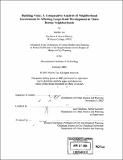Building voices : a comparative analysis of neighborhood involvement in affecting large-scale development in three Boston neighborhoods
Author(s)
Tai, Martha, 1973-
DownloadFull printable version (8.476Mb)
Alternative title
Comparative analysis of neighborhood involvement in affecting large-scale development in three Boston neighborhoods
Other Contributors
Massachusetts Institute of Technology. Dept. of Urban Studies and Planning.
Advisor
Karl Seidman.
Terms of use
Metadata
Show full item recordAbstract
(cont.) In particular, neighborhood divisions not only prevent the collective interests of the neighborhood from being addressed but can also enable the city to put aside neighborhood interests in favor of maintaining the interests of the greater public. In addition, the thrust of a neighborhood's effort to effectuate project changes must be channeled through its advisory power to successfully convince and persuade the Boston Redevelopment Authority (BRA) and developer. Furthermore, the level of institutional support that a neighborhood group garners can fluctuate according to the degree of neighborhood unity conveyed. Lastly, recommendations are presented to inform Boston neighborhoods of ways in which they can strengthen their influence as they continue to tackle large projects proposed in their boundaries. This thesis compares the outcome of three Boston neighborhood groups' efforts to effectuate project changes to three specific large-scale development proposals in their neighborhoods. Specifically, the experiences of Fight Liberty Place (FLP) in opposing Liberty Place in Chinatown, Old Dover Neighborhood Association (ODNA) in shaping Dover Residences in the South End, and the Battery Wharf Working Group (BWWG) in affecting Battery Wharf in the North End were examined. A neighborhood's ability to influence project changes was found to be a function of internal neighborhood unity in and institutional support for the neighborhood. Institutional support is used to mean support from city representatives who can exert influence in the development approval process and make a concerted effort to work with a neighborhood to either implement project changes or withhold approval of a project in response to neighborhood demands. Based on the findings of the three cases, it has been surmised that changes in design and off-site mitigation can be more easily secured than changes in dimensions, use, and affordable housing. The experiences of the three neighborhood groups also highlight tactical considerations that neighborhoods should bear in mind when proceeding with a strategy against a development.
Description
Thesis (M.C.P.)--Massachusetts Institute of Technology, Dept. of Urban Studies and Planning, 2004. Includes bibliographical references (p. 108-109).
Date issued
2004Department
Massachusetts Institute of Technology. Department of Urban Studies and PlanningPublisher
Massachusetts Institute of Technology
Keywords
Urban Studies and Planning.